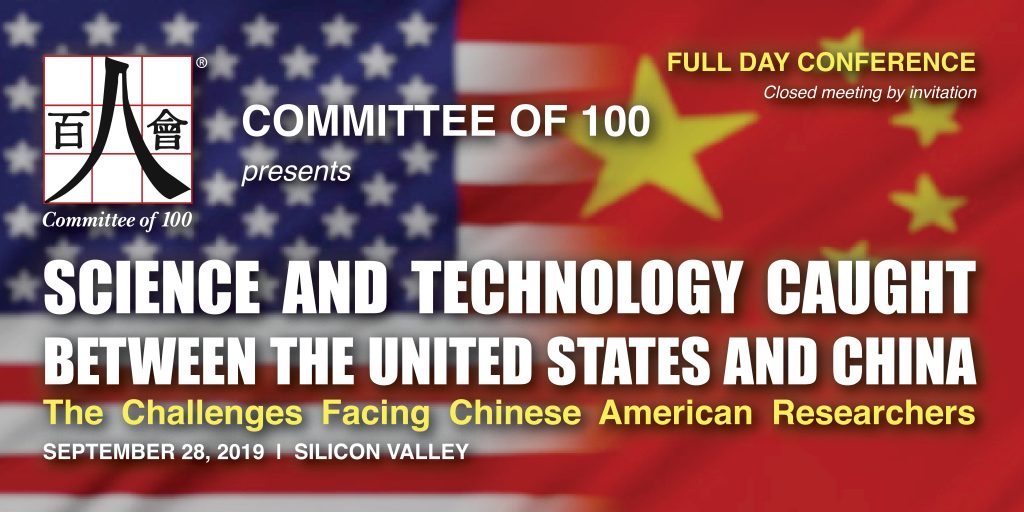
The Committee of 100 (C100) is a non-profit leadership organization of prominent and extraordinary Chinese Americans in business, government, academia, and the arts. Founded by world-renowned architect I.M.Pei and internationally acclaimed cellist Yo-Yo Ma, among others, it is an institution of U.S. citizens of Chinese heritage. For 30 years, C100 has served as a preeminent organization committed to the dual mission of promoting the full participation of Chinese Americans in all aspects of American life and constructive relations between the United States and Greater China.
Executive Summary
On September 28, 2019 the Committee of 100 hosted an unprecedented full-day, by-invitation conference entitled “Science and Technology Caught Between the United States and China: Challenges Facing American Researchers, Academia, Business, and the Chinese American Community” in Silicon Valley. With rising concerns of Chinese espionage in the United States and escalating tensions between the U.S. and China, Chinese Americans, especially those in science and research, have felt increasingly scrutinized by employers, colleagues, and prosecutors. These issues have had a chilling impact, not only on individual scientists and researchers, but also on universities, research institutions, and businesses.
The timely gathering was organized by C100 in collaboration with 30 other scientific and nonprofit organizations. Please see below for the full list of partnering organizations. For official press release, please see the following link.
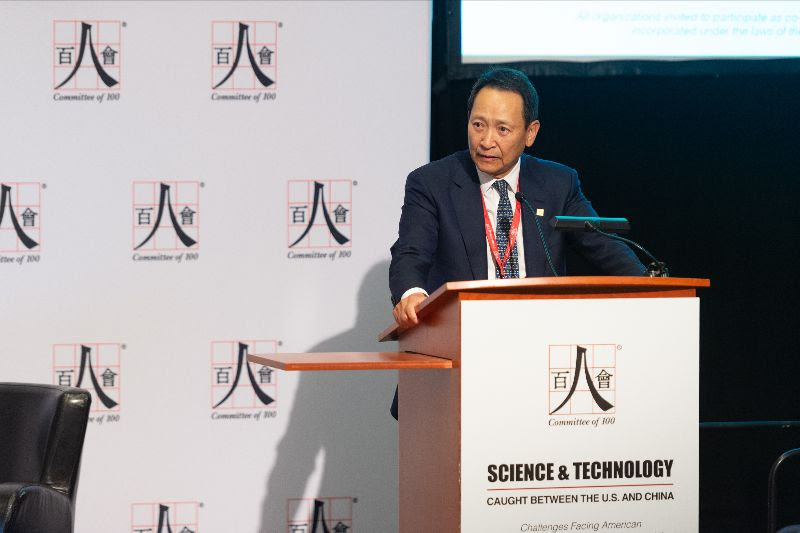
H. Roger Wang, C100 Chairman and Chairman & CEO of Golden Eagle International Group, welcomed conference attendees and encouraged those gathered to approach these challenging issues with an open mind and heart. He also thanked Conference Chair Charlie Woo and other C100 members who helped to organize the conference, and acknowledged the longtime service of outgoing C100 President Frank H. Wu.
Ambassador Gary Locke, 10th U.S. Ambassador to China; 21st Governor of Washington; Former U.S. Secretary of Commerce; and C100 member, set the tone for the conference by noting that although the current tensions between the U.S. and China were negatively impacting Chinese Americans, especially those who worked in STEM fields, this is not just a Chinese American issue, but an American issue. He not only noted the increased scrutiny of Chinese Americans, but also emphasized that for many researchers, “the whole basis of their life’s vocation, the ability to study and conduct and exchange research in a free and open environment, free of prejudice and suspicion is increasingly at risk.”
Ambassador Locke also pointed to Chinese Americans who have made important contributions to American history, and reminded the audience not to repeat episodes from history, such as the 1882 Chinese Exclusion Act, when whole groups of people were judged solely on the color of skin or their ethnic heritage. The challenges before us must be solved collectively. Ambassador Locke hoped that through the conference, we have the “real opportunity to do something great and positive and uniquely American.”
Opening Keynote: An Overview of U.S.-China Geopolitics
Professor Susan L. Shirk, Chair of the 21st Century China Center at the School of Global Policy & Strategy at UC San Diego & Former U.S. Deputy Assistant Secretary of State, provided historical context, noting that where there was previously constructive engagement between the U.S. and China, the two countries are now becoming so fearful of one another that they are “weaponizing the interdependence that they have built.” She concluded that “the consequences of decoupling would be tragic,” and advocated for serious negotiation between the two countries. She also noted that America should double down on American openness and not put restrictions on science and technology cooperation. Ambassador Locke then joined Professor Susan Shirk in conversation and shared their thoughts about the current U.S.-China geopolitical environment.
Keynote Panel: The Impact on Scientific Research, Technology, and Academia
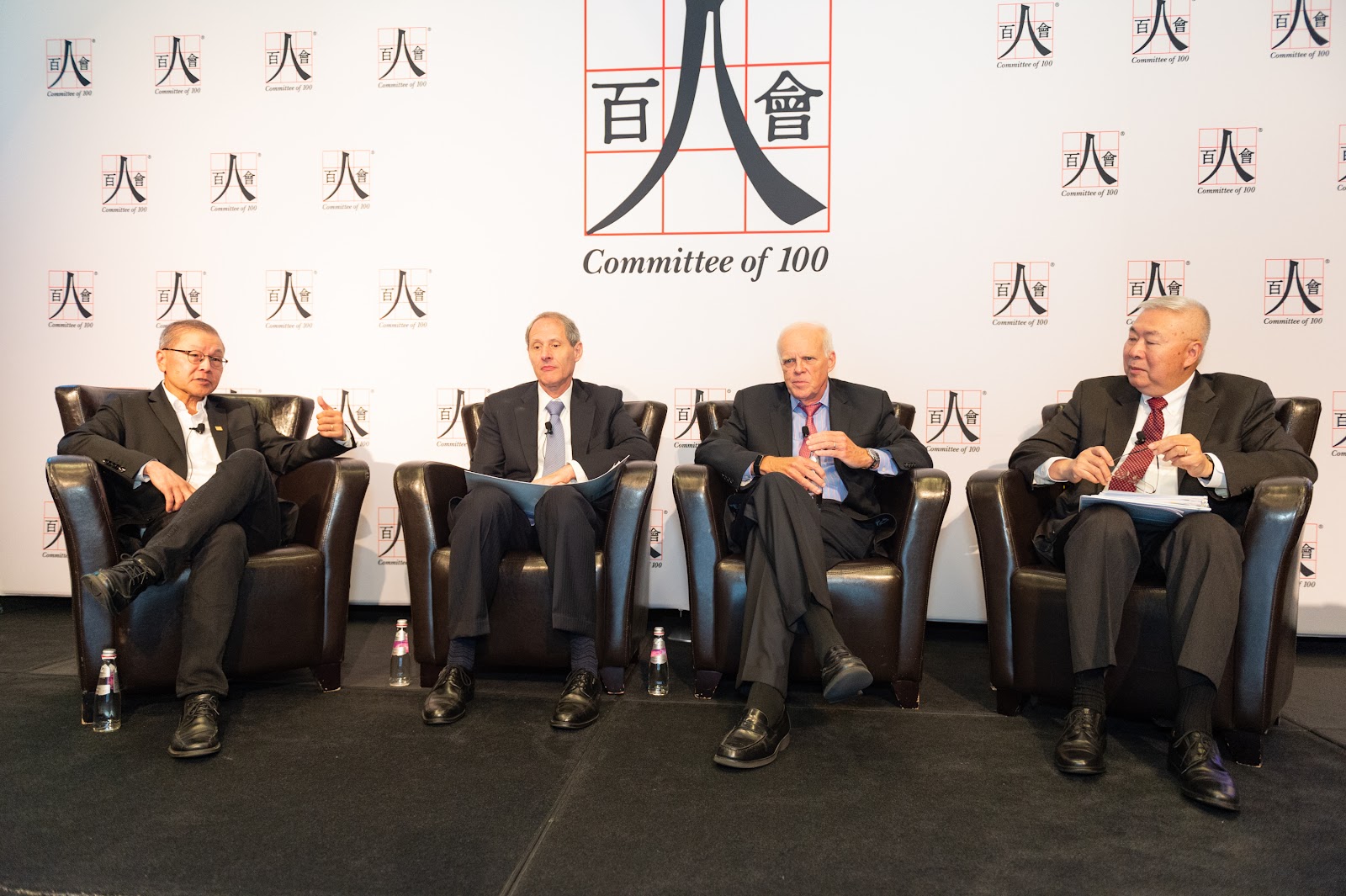
Following the opening keynote, C100 members Nelson Dong, Partner at Dorsey & Whitney, and Dr. David Ho, Renowned HIV Scientist & Scientific Director at the Aaron Diamond AIDS Research Center, joined Dr. John L. Hennessy, Chairman of Alphabet Inc. & President Emeritus at Stanford University, and Dr. Thomas F. Rosenbaum, President of the California Institute of Technology, for an important discussion on the impact on science, technology, and academia. Nelson recognized the invaluable contributions immigrants have made to American science and technology and institutes of higher learning. The panel agreed that in order for advancements to improve the global quality of life, research must remain open between the two countries and include the free flow exchange of ideas. Dr. Rosenbaum added, “We create knowledge by bringing together people of diverse perspectives, of different backgrounds, of distinct sensibilities, and letting them hone their conceptions of the world by confronting and shaping each other’s ideas.” Dr. Ho cautioned against the more serious threat of creating a toxic environment that drives away talented Chinese scientists. Dr. Hennessy summed up the big picture by noting, “We do not have an epidemic, we have a few problems. The danger when you have a few problems is that it’s very easy to come up with a cure that is worse than the disease that exists…and those cures would undermine this country’s scientific leadership [and] our ability to be the technology and talent magnet for the world…That in the long run will destroy U.S. leadership in science and technology, and have dramatic implications for our economic and national security.”
Luncheon Plenary
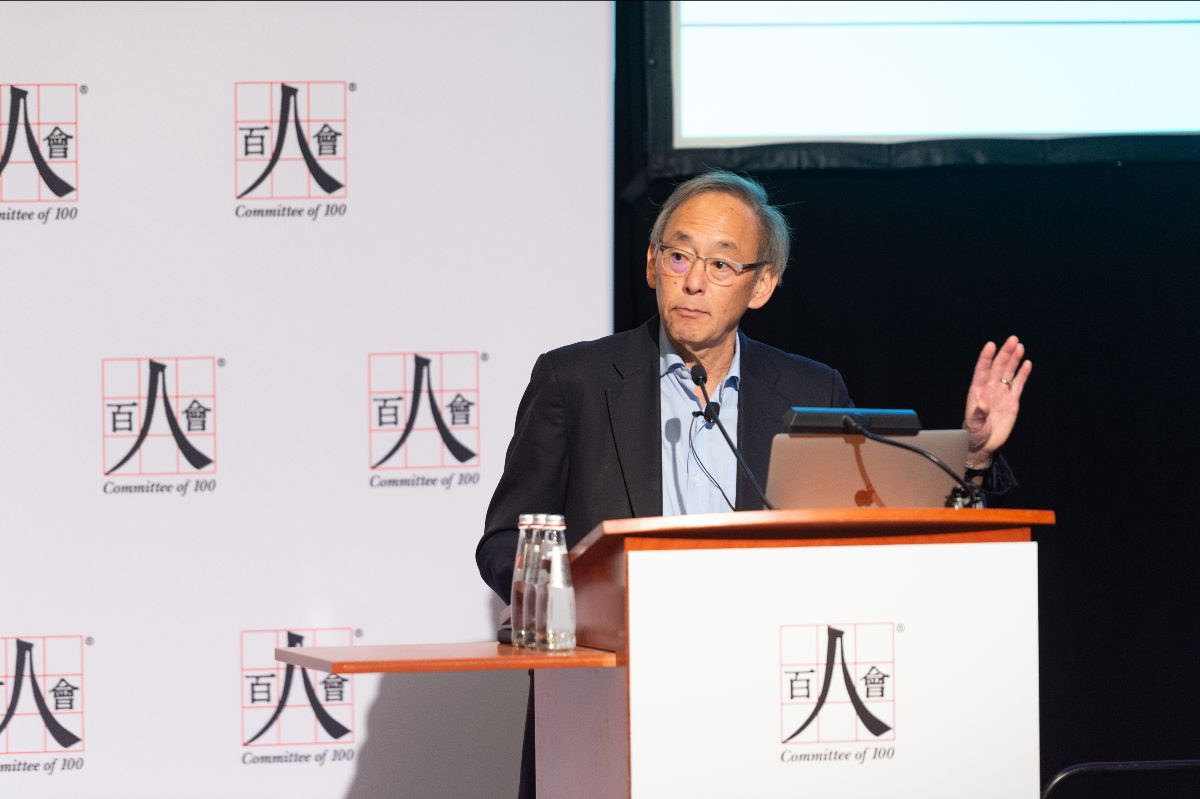
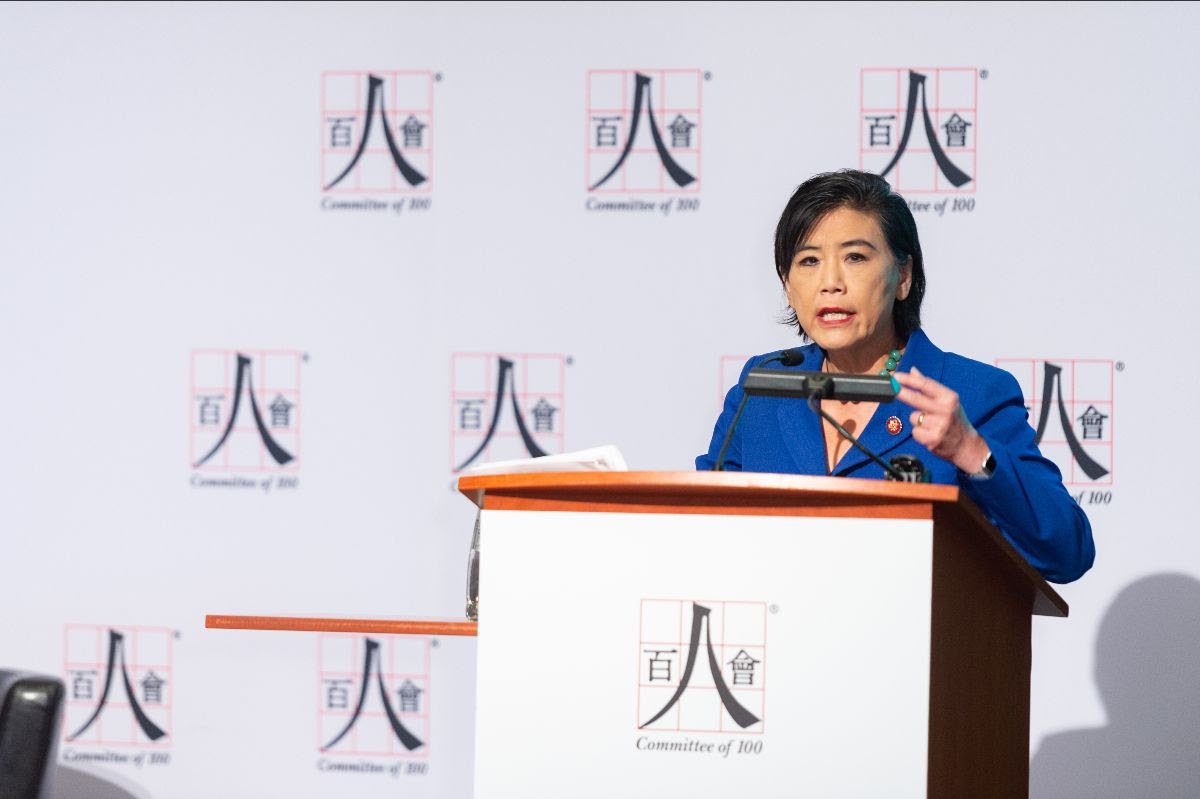
For the luncheon plenary, C100 member Dr. Morgan Chu, Partner and Chair of Litigation Practice at Irell & Manell, warmly introduced his brother, Dr. Steven Chu, Nobel Laureate; Former U.S. Secretary of Energy; William R. Kenan, Jr., Professor of Physics and Professor of Molecular & Cellular Physiology in the Medical School at Stanford University. Dr. Steven Chu provided insight on the complex challenges currently facing industry and academia, and expressed concern about the overreaction by the government to potential espionage in basic research. He agreed with the previous panel that though there were a few bad apples, there does not appear to be widespread espionage at academic institutions. He argued instead of putting up borders, “we need to nurture the intellectual capabilities in the United States, the students, which include a large fraction of foreign Chinese students.” Afterwards, C100 member Buck Gee, Board Member of the Angel Island Immigration Station Foundation, introduced Congresswoman Judy Chu who shared about the ongoing fight on behalf of the Chinese American community that is taking place in both Capitol Hill and across the country. Together with the Congressional Asian Pacific American Caucus (CAPAC), Congresswoman Chu has been keeping a careful watch on legislation that may implicitly or explicitly cast aspersions on Chinese Americans as being spies for China. She commented “that the broad brush stroke in attacking anything Chinese is resulting in harmful actions to Americans as well” and urged the audience to educate the public on this issue.
Policy Briefing
The afternoon session began with a policy briefing from Robert W. Gee, C100 Washington D.C. Regional Chair & President of Gee Strategies Group. He presented updates from Capitol Hill and how C100 has maintained ongoing relationships with elected officials from both parties, as well as within the Executive branch in order to work on these issues. Bob then introduced the Honorable David Stilwell, U.S. Assistant Secretary of State for the Bureau of East Asian & Pacific Affairs, who provided through a live video conference call the Trump administration’s perspective on espionage by China. Assistant Secretary Stilwell shared that “science is indeed a global endeavor, that means international cooperation in science is as vital as ever. Science can build bridges internationally, but misused as history teaches us all too well, science and technology can set back causes of international peace, prosperity and human rights, and other things.” After the live video conference call, attendees watched a recorded video message from the Honorable Adam Schiff, Congressman and Chair of the House Intelligence Committee, who discussed the importance of Chinese Americans in U.S. history and noted that “racial profiling of Americans of Chinese descent is contrary to our values and we must reject it.”
Business and Technology Panel: The Impact on Business and the Technology Industry
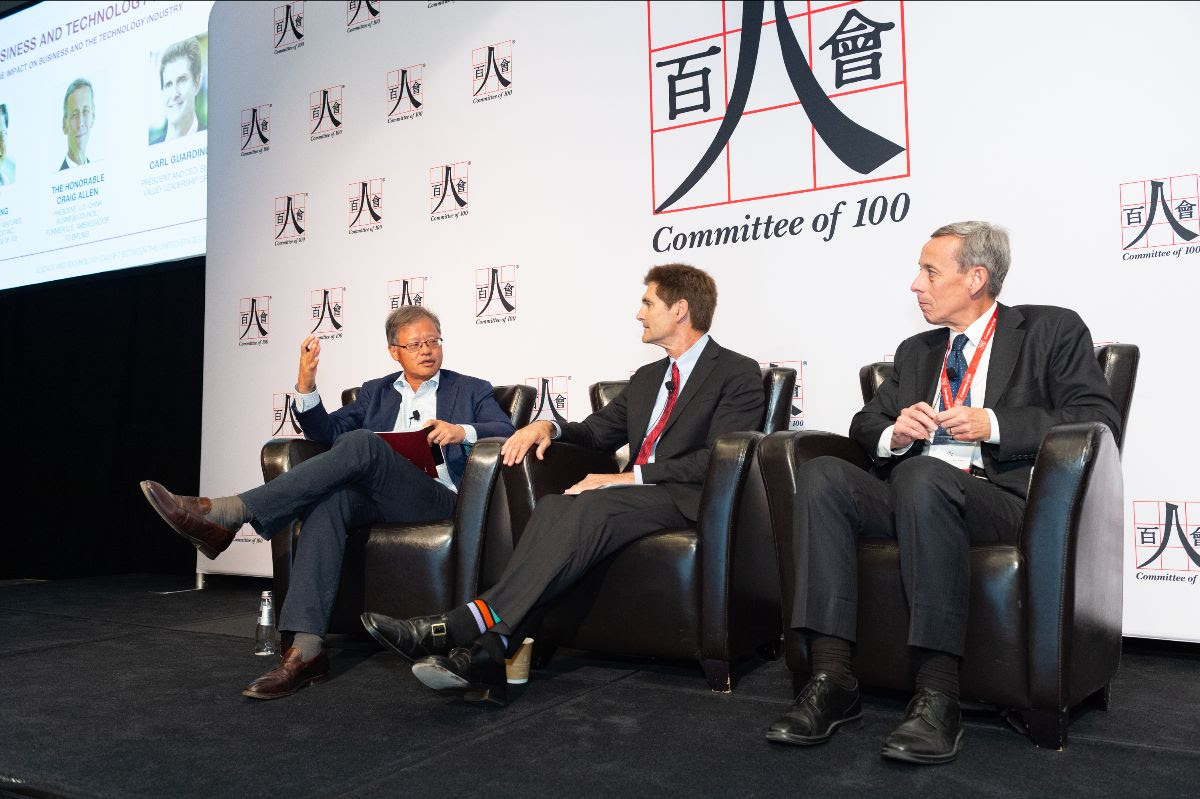
The business and technology panel began with opening remarks from C100 member Jerry Yang, Partner of AME Cloud Ventures & Co-founder of Yahoo.com, who touched on the impacts that increased scrutiny would have on immigration and the business community. Ambassador Craig Allen, President of the U.S.-China Business Council, highlighted the shift in national security strategy from 2015 to 2017 and how cooperation between the United States in China is no longer as viable as it once was. But he noted, “Neither side wants more tariffs, both sides are dealing with slowing economies, both sides realize that their actions could have global consequences, the global economy is under stress now and there is no desire by anybody to weaken the global economy.” Carl Guardino, President and CEO of the Silicon Valley Leadership Group, reminded the audience of the many contributions that Chinese Americans have made to the country and to Silicon Valley. He noted that “policies that restrict the flow of talent from abroad are bad for our innovation economy everywhere in this country, but nowhere is the damage more acute than here in Silicon Valley.”
Law & Justice Panel: Legal Perspectives and Impact
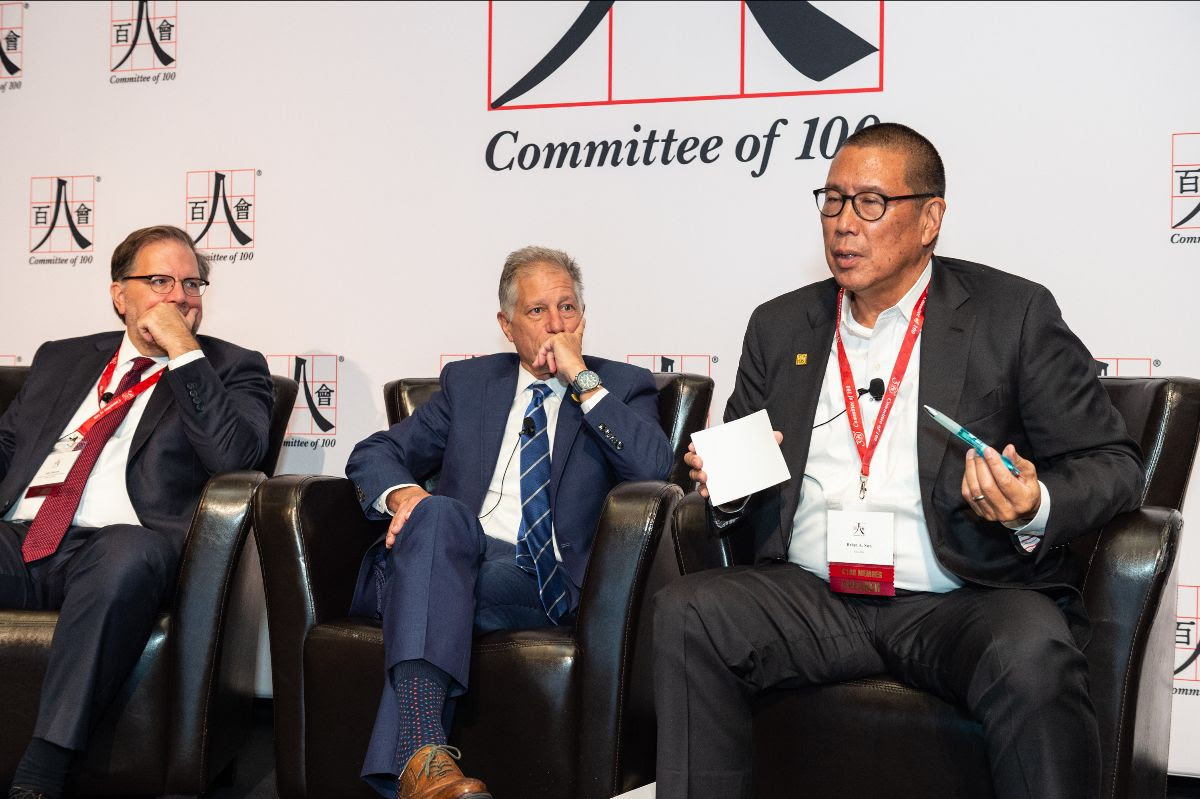
C100 member Brian Sun, Partner-in-Charge at Jones Day Los Angeles, chaired the law and justice panel which featured John Hemann, Assistant U.S. Attorney, Chief, Special Prosecutions, Northern District of California, Department of Justice; and Peter Zeidenberg, Partner, Arent Fox; Former Federal Prosecutor, Department of Justice. Brian began by reminding the audience that we must not allow our fears to erode America’s talent pool and noted that “the last thing we want is to chase our top talent back to China.” He recounted his experience on the Wen Ho Lee case of 1999 and noted that history was repeating itself as many of the current cases that involve Chinese Americans also appear to be a result of a rush to judgement. He emphasized the need for increased education and awareness around these issues. John Hemann provided the Department of Justice (DOJ) perspective and explained that “to the DOJ, it is unquestionably the policy and practice of the PRC to attempt to obtain intellectual property from both companies and academic institutions in the U.S.” Despite this, Hemann explained the standard process that the DOJ follows to assess cases of espionage is not driven by race, adding, “The appropriate way for us to act is to investigate conduct, it is not to investigate people, it is to investigate conduct and figure out, whether it was misconduct and if it was committed by a person. It is neither the policy nor the practice of the Department of Justice to begin with ethnicity or national origin and see if we can find a crime.” Peter Zeidenberg then shared his recent experience representing exclusively wrongfully accused Chinese American scientists over the last five years. According to Zeidenberg, the government has overreacted and “instead of worrying about luring them out, we’re chasing them out.”
A Personal Perspective
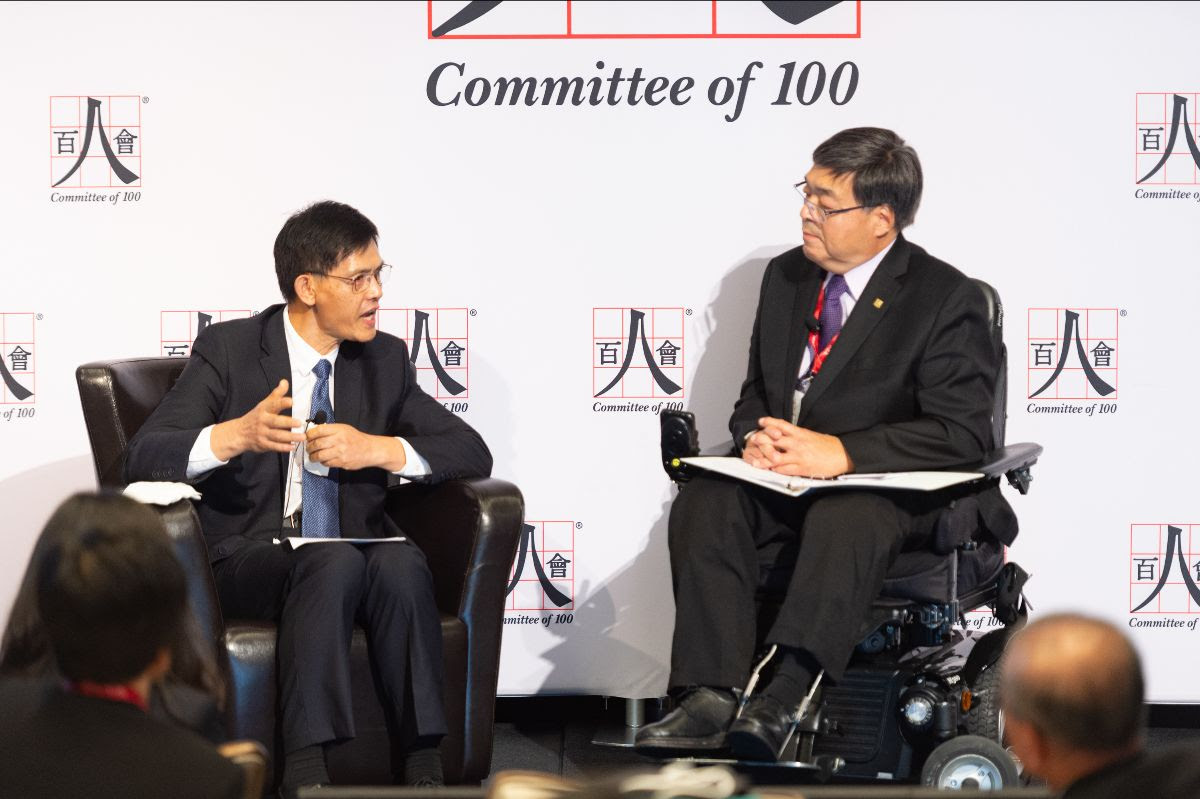
The conference concluded with Professor Xiaoxing Xi, Laura H. Carnell Professor & Former Physics Department Chair at Temple University, sharing his personal story and the background behind his case. After pursuing a path in physics, Professor Xi would later be charged with accusations of providing restricted technology to China. Displaying great strength, Professor Xi recalled the traumatic details surrounding his arrest when FBI agents stormed into his home in Pennsylvania with guns pointed at him, his wife and two daughters. In the ensuing four months, it was difficult for the family to meet the financial needs for legal defense. During this dark and uncertain time, he would remind his family, “let’s not fold, if we hold on, we have the truth. If we fold we’ll have nothing.” Moving forward, he believed that we need to hold the government accountable in cases of false accusations. He noted, “Don’t think this won’t happen to you. You don’t have to do anything wrong to be accused of Chinese spying.”
Closing Remarks
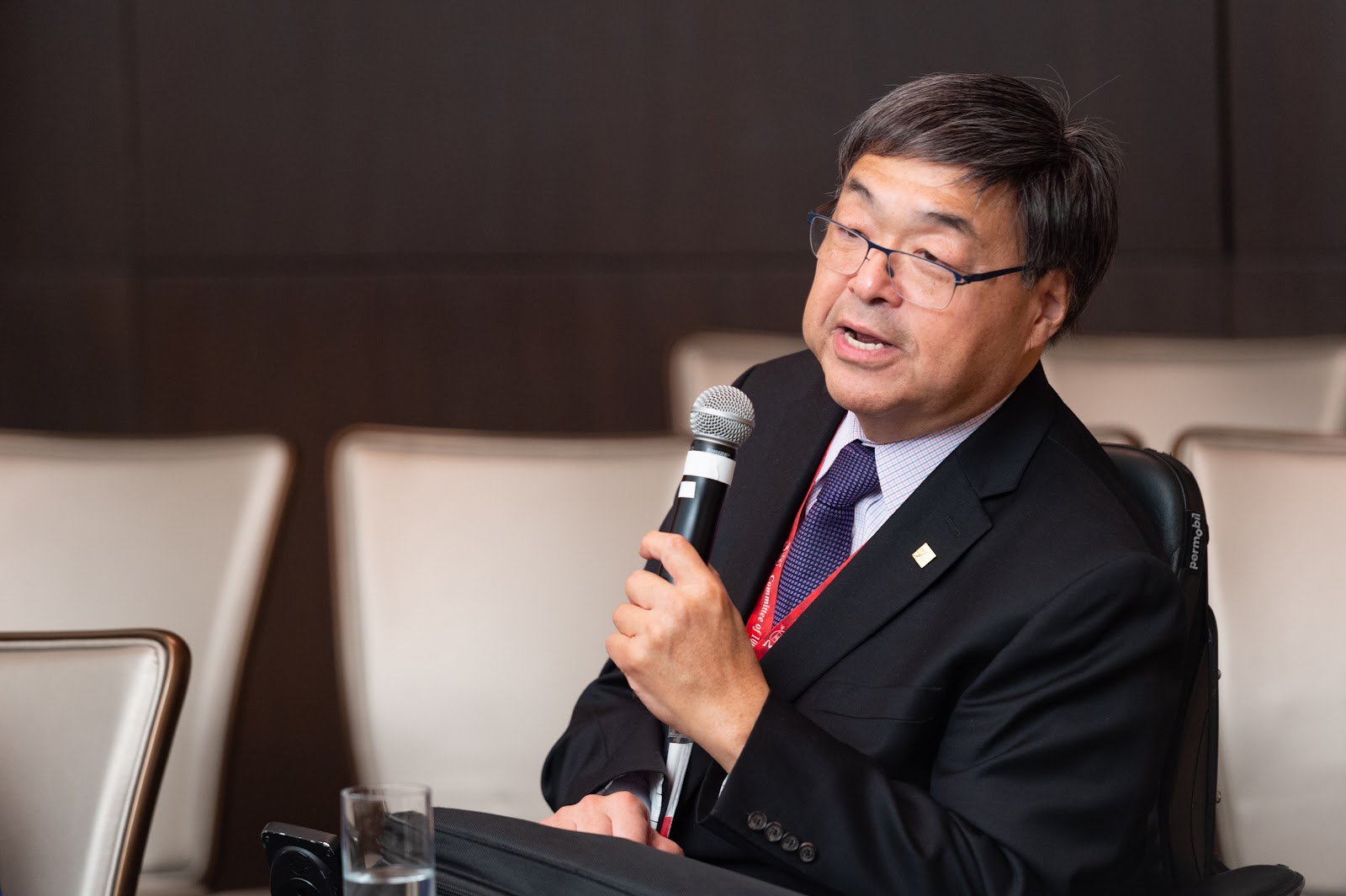
Charlie Woo, C100 Conference Chair, Acting Vice Chair and Public Policy Committee Chair & CEO & Co-founder of Megatoys, provided closing remarks and thanked C100 Chairman H. Roger Wang for making the conference possible and other C100 members who contributed to the conference planning. Charlie remarked, “I don’t think there’s any doubt that from our business, education leaders, and tech innovation leaders, there is a unanimous feeling that this is not just bad for Chinese Americans, Asian Americans, this is actually bad for America…This is not just a fight for our community and our equal rights. This is a fight for America and we are part of it. We have a responsibility to do our part.”Charlie added, “What we thought was a discussion against racial profiling is growing into a national issue about brain drain and the future of this country. We value this country because we contribute to this country, because we are not judged by where we came from, where our parents came from, but by what we do and what we contribute to America. We are not alone in this fight. The conference ends but our efforts are just beginning.”
Back to Top
Media Coverage
- American Institute of Physics: Scientists Seek Clarity Amid US Security Push (November 8, 2019)
- Congressional Quarterly: Red Scare – Innocent Chinese Scientists in the U.S. caught up in espionage dragnet (October 28, 2019)
- Forbes: Chinese-American Groups Trying To Push Back Against Loyalty Tests, Discrimination (October 3, 2019)
- Los Angeles Times: Leading Chinese American scholars decry racial profiling from Trump’s hard-line policies against China
(September 29, 2019)
- South China Morning Post: Chinese-Americans urged to fight back to dispel growing cloud of suspicion and discrimination in US (October 1, 2019)
- Science: NIH reveals its formula for tracking foreign influences (October 4, 2019)
- AsAm News: US scrutiny of Chinese scientists sends chill through Silicon Valley (September 30, 2019)
- World Journal: 被針對性地當間諜… 百人會:美中緊張 華裔面臨敵意 (September 29, 2019)
- World Journal: 百人會論壇 探討中美緊張關係 (September 29, 2019)
- Xinhua: U.S. urged to stay open at Silicon event (September 28, 2019)
- Xinhua: Continued U.S.-China economic engagement serves long-term interests of both, says leader of prominent U.S. group (September 29, 2019)
Videos
For more videos of the conference, please click here.
Relevant Resources
I. FEDERAL UPDATES AND RESOURCES
The landscape of federal policy affecting science and technology is rapidly evolving throughout the country. C100 has compiled a number of important statements and resources from the federal Administration and agencies relevant to research policies, such as the White House Office of Science and Technology Policy (OSTP), National Institute of Health (NIH), Federal Bureau of Investigation (FBI), Department of Energy (DOE), and others.
- White House Office of Science and Technology Policy (OSTP) – “Letter to the United States Research Community” (September 16, 2019)
- U.S. Department of State U.S. Assistant Secretary of State Marie Royce’s remarks on Chinese Students in the U.S. (July 30, 2019)
- National Science Foundation (NSF) Letter from Director on Research Protection (July 11, 2019)
- Department of Energy (DOE) Order on Foreign Government Talent Recruitment Programs (June 7, 2019)
- National Institute of Health (NIH) Presentation: “Foreign Influences on Research Integrity” (December 18, 2018)
- Department of Justice (DOJ) / Federal Bureau of Investigation (FBI) China Initiative Attorney General Jeff Sessions Announces New Initiative to Combat Chinese Economic Espionage, Department of Justice China Fact Sheet 1, Attorney General China Fact Sheet 2 (November 1, 2018)
- National Institute of Health (NIH) “Statement on Protecting the Integrity of U.S. Biomedical Research” (August 23, 2018)
- White House Office of Trade and Manufacturing Policy “How China’s Economic Aggression Threatens the Technologies and Intellectual Property of the United States and the World” (June 2018)
- FBI Training Resources on Counterintelligence (including but not limited to):
- Economic Espionage “Protecting America’s Trade Secrets: an introduction to detecting and deterring an insider spy”
- Elicitation Techniques “This brochure is an introduction to elicitation and elicitation techniques. Understanding the techniques and the threat may help you detect and deflect elicitation attempts.”
- The Insider Threat “An introduction to detecting and deterring an insider spy”
- Intellectual Property Protection “Safeguard Your Company’s Trade Secrets, Proprietary Information and Research”
II. PUBLIC STATEMENTS FROM ACADEMIA, NONPROFITS, & SCIENTIFIC GROUPS
- Statement by Lee C. Bolinger ( Link ), President, Columbia University, 8/30/19 (Washington Post)
- Statement by Rebecca Blank ( Link ), Chancellor, University of Wisconsin, 8/22/19 (UW Website)
- Statement by Fanam Jahanian ( Link ), President, Carnegie Mellon, 8/15/19 (UCA Website)
- Statement by Patrick Gallagher ( Link ), Chancellor, University of Pittsburgh, 7/22/19 (Pitt Website)
- Statement by Thomas F. Rosenbaum ( Link ), President, California Institute of Technology, 7/11/19 (University Statement)
- Statement by L. Rafael Reif ( Link ), President, Massachussetts Institute of Technology, 6/25/19 (MIT News)
- Statement by Barbara R. Snyder ( Link ), President, Case Western Reserve University, 6/11/19 (UCA Website)
- Statement by Wallace Loh ( Link ), President, University of Maryland, 5/30/19 (UMD Website)
- Statement by Peter Salovey ( Link ), President, Yale University, 5/23/19 (Yale Website)
- Statement by David Leebron ( Link ), President, Rice University, 5/17/19 (Rice Website)
- Statement by Dennis Assanis ( Link ), President, University of Delaware, 5/10/19 (UDel Website)
- Statement by Gary S. May ( Link ), Chancellor, University of California Davis, 4/22/19 (UC Davis Website)
- Statement by Mark S. Schlissel ( Link ), President, University of Michigan, 3/28/19 (UM Website)
- Statement by Marc Tessier-Lavigne ( Link ), President, Stanford of University, 3/7/19 (Stanford Website)
- Statement by Carol Christ ( Link ), Chancellor, University of California Berkeley, 2/21/19 (Berkeley News)
- Group Statement ( Link ) on 8/12/19 from 22 education and Chinese American organizations signed by:
ACPA-College Student Educators International, American Association of University Professors, Asian American Unity Coalition, Asian Pacific American Bar Association of Pennsylvania, Asian Pacific Islander, American Public Affairs Association, Association for the Study of Higher Education, Association of American Colleges and Universities, Association of University Presses, Chinese American Citizens Alliance, Chinese Biopharmaceutical Association, Chinese for Affirmative Action, Defending Rights & Dissent, Foundation for Individual Rights in Education, Heterodox Academy, International Society of Political Psychology, National Coalition Against Censorship, OCA – Asian Pacific American Advocates, Ohio Chinese American Association, PEN America, Scholars at Risk, United Chinese Americans, 80-20 Educational Foundation
- Group Statement ( Link ) by “Chinese scientists and US leadership in the life sciences” signed by approximately 150 individuals, 8/21/19
III. COMMITTEE OF 100 HISTORICAL EFFORTS & EDUCATIONAL PUBLICATIONS
In 1999 and 2000, C100 led a major initiative and formed a coalition of sixteen organizations to defend and raise national awareness of the denial of due process in the Wen Ho Lee case of alleged espionage. In 2012, C100 began conducting educational workshops throughout the country to inform Asian Americans in the scientific community on the risks and requirements of U.S. laws on trade secrets, espionage, and export controls. In 2016, C100 launched a Legal Defense and Educational Fund ( Link ) to educate and support individuals facing civil rights violations and to promote due process. In support of these efforts, C100 has published the following resources (printed and available online)
Partner Organizations
Community Partners

All organizations invited to participate as co-sponsors or community partners for this specific convening are independent of C100, and they are each respectively incorporated under the laws of the United States and its states, including Internal Revenue Code section governing non-profit organizations.